人教新目标版七年级下册 Unit 10 I'd like some noodles Section A课件(共20张PPT)
文档属性
| 名称 | 人教新目标版七年级下册 Unit 10 I'd like some noodles Section A课件(共20张PPT) | 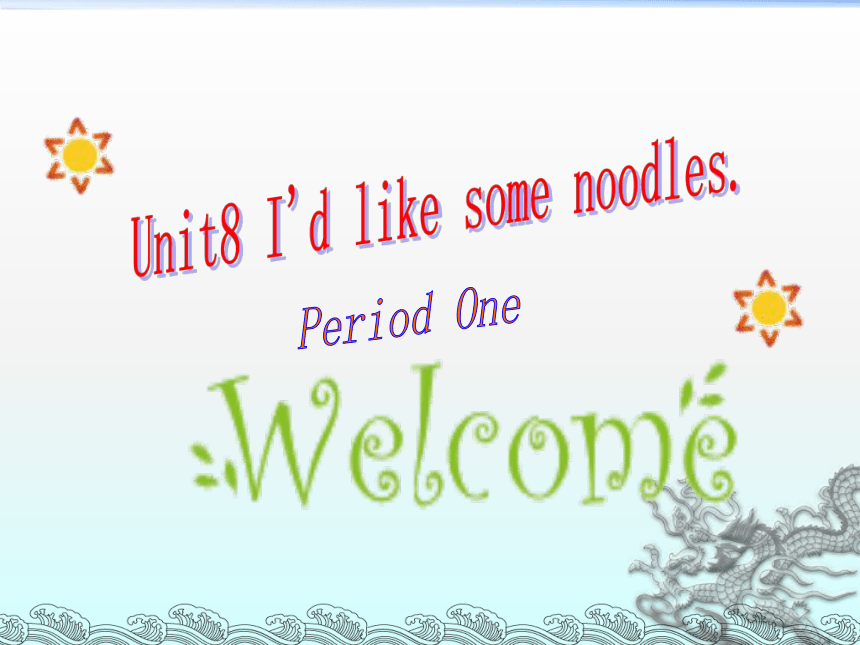 | |
| 格式 | ppt | ||
| 文件大小 | 1.3MB | ||
| 资源类型 | 教案 | ||
| 版本资源 | 人教新目标(Go for it)版 | ||
| 科目 | 英语 | ||
| 更新时间 | 2023-07-06 20:06:58 | ||
图片预览

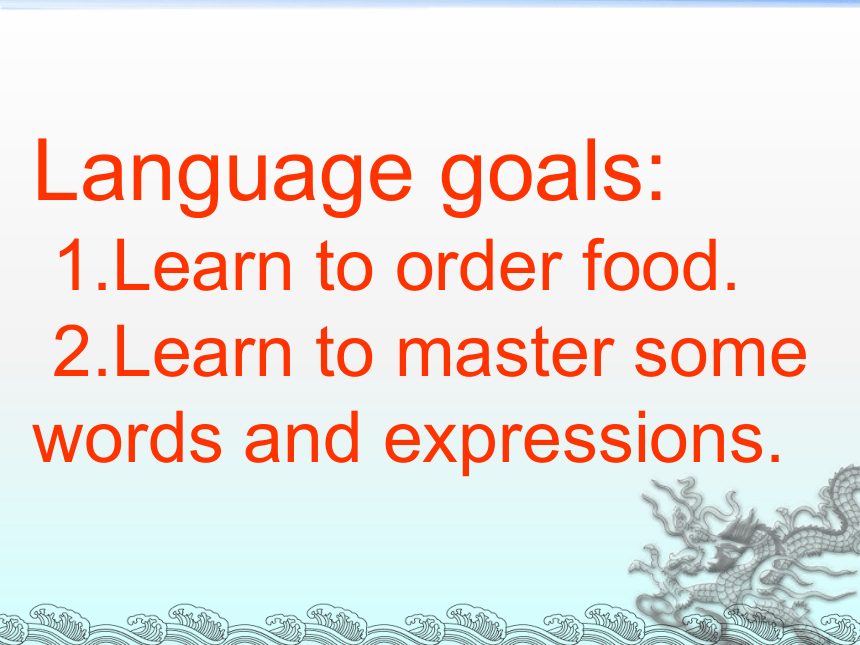
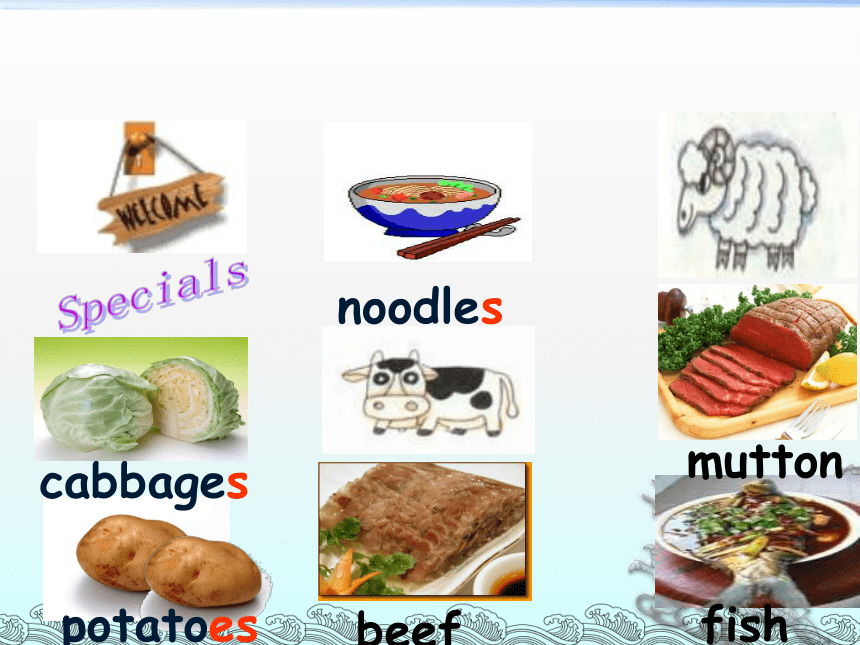
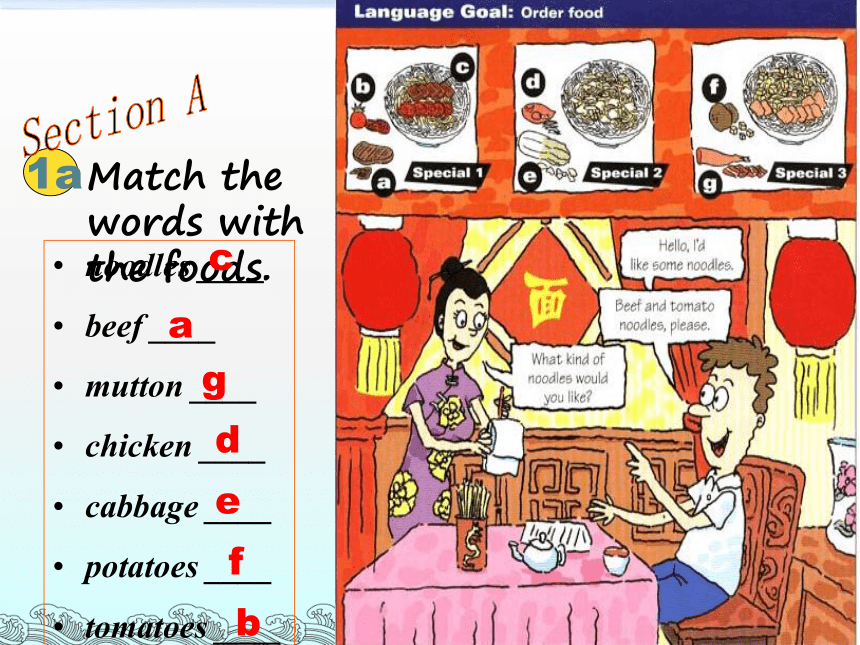
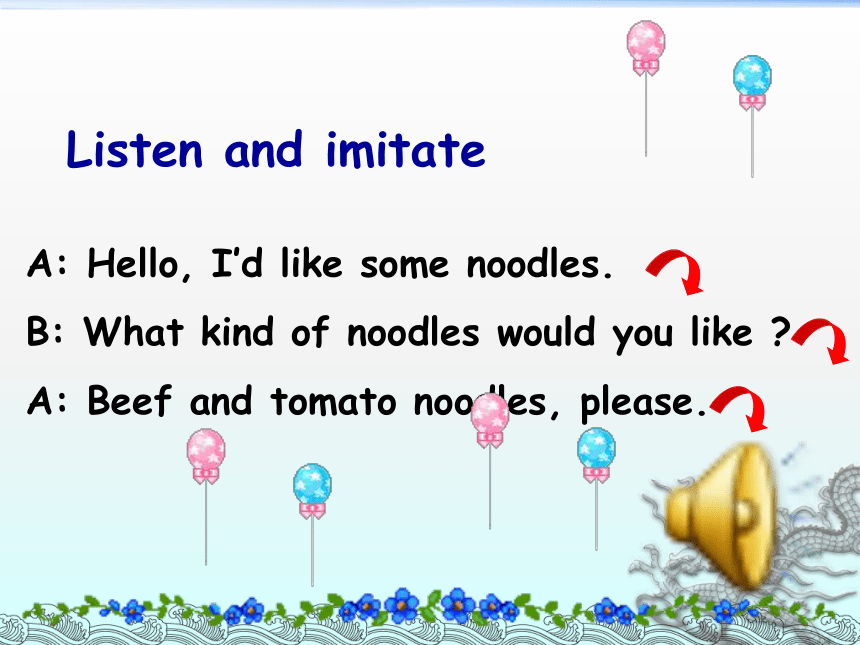
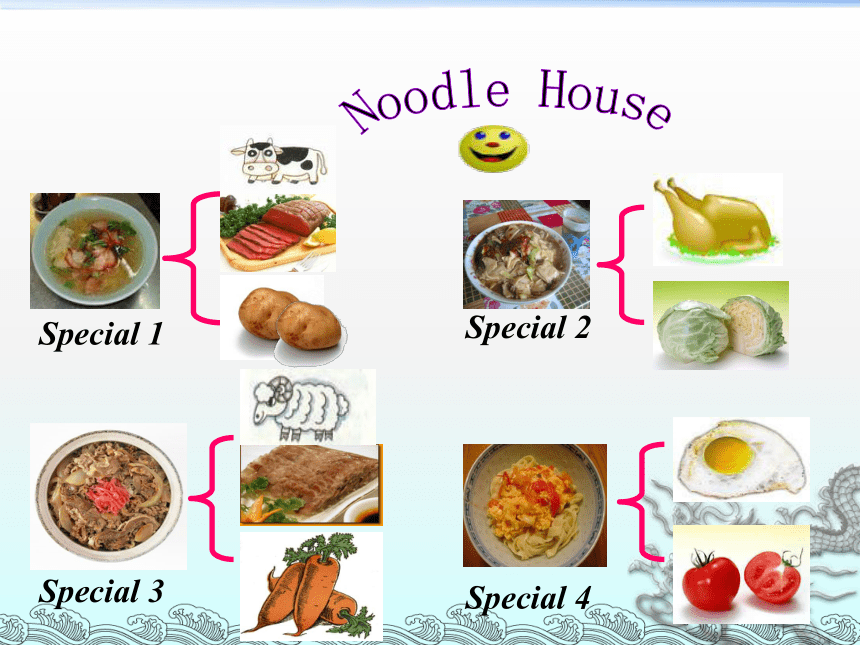
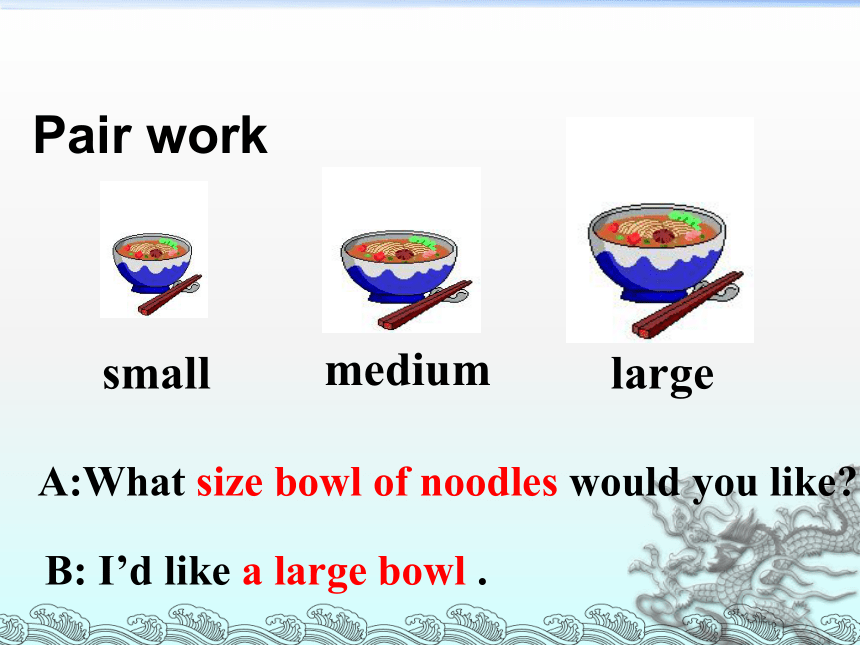
文档简介
(共20张PPT)
Language goals:
1.Learn to order food.
2.Learn to master some words and expressions.
noodles
cabbages
potatoes
fish
beef
mutton
noodles ____
beef ____
mutton ____
chicken ____
cabbage ____
potatoes ____
tomatoes ____
Match the words with the foods.
1a
c
a
g
d
f
e
b
Listen and imitate
A: Hello, I’d like some noodles.
B: What kind of noodles would you like
A: Beef and tomato noodles, please.
Special 1
Special 2
Special 3
Special 4
small
medium
large
A:What size bowl of noodles would you like
B: I’d like a large bowl .
Pair work
A: Can I help you
B: I’d like some noodles , please .
A: What kind of noodles would you like
B: I’d like mutton and potato noodles , please .
A: What size bowl of noodles would you like
B: I’d like a medium bowl , please .
mutton and carrot noodles
tomato and egg noodles
beef and patato noodles
chicken and
cabbage noodles
Imagine you are a waiter or a waitress , make conversations with your partener.
1. I’d like some noodles.
I’d like = I would like
would like动词短语意为“想要, 愿意”, 相当于want, 但比want语气委婉, 没有人称和单复数的变化, would可以和主语缩写成“d”的形式。
Explanation
它比较固定的搭配有三种:
(1) would like sth. 跟名词或代词作宾语表示想要某物。
I’d / I would like some noodles.
我要些面条。
⑵ would like to do sth. 想干某事
He’d / He would like to talk with you. 他想和你谈谈。
⑶ would like sb.to do sth. 想要某人做某事
They’d /They would like me to stay here.
他们要我留下来。
2. What size bowl of noodles would he like
size名词,意思是“尺寸、尺码、大小”既可以表示物体的大小, 又可以用来表示服装、鞋帽等的尺码、号码等。常以large,简写为L(XL超大号的), medium简写为M(中号的), small简写为S(小号的)来表示。
如:What size shoes do you wear
你穿多大的鞋?
I wear Size 7. 我穿7号鞋。
3. tomato和其他以o结尾的名词的复数。
以o结尾的名词复数有的要加-es,有的要加s, 一般来说无生命的名词变复数时加-s, 有生命则加-es, 同学们不妨记住下面两句话:
(1)小马虎弹着钢琴(piano)听着收音机(radio),又到动物园(zoo)照了张相(photo),但考试得了个大鸡蛋(零分zero),一律加s。
(2)黑人(Negro)英雄(hero)爱吃土豆(potato)西红柿(tomato),全部加es。
4. We have large, medium and small bowls.
large与big:
big与large都有“大”的含义, 但big侧重表示一个物体的块、重量, 含有“庞大、笨重”之意, 其反义词是little。如:
The elephant is very big.
large用来指体积、面积、容积及范围之大,其反义词是small。如:
large family 大家庭
a large man 一个肥胖的人
在口语中big与large可互换,big较为口语化。
一、根据句意及汉语提示完成句子。
1.There’s much ____ (牛肉) in my bowl.
2.I love ______ (面条).They are delicious
3.Tom thinks noodles with _______(鸡肉)are the best.
4.What _____(尺寸)would you like
5.They ____ ____ (想要)some mutton.
二、单项选择:
( )1.--What kind of noodles ___you like --I’d like tomato noodles.
A. had B. do C. would
( )2.____ like some apples
A. He B. He’d C. He’s
( )3.Alice would ____ beef and tomato noodles.
A. would like B. like C.likes
( )4.--What size bowl of noodles would you like --I’d like a __ one.
A.tomato B. tomatoes C. large.
( )5._____ chicken would you like
A. How many B.How much C.Whose.
beef
noodles
chicken
size
would like
C
B
B
C
B
三、链接中招:补全对话
A: _____________
B: Yes , please.
A:________________________________
B: I’d like beef and tomato noodles , please.
A:___________________________________
B: Two large bowls of noodles , please.
A: Here you are.
B: __________________
A: Ten yuan , please.
B: Thank you very much.
A: ______________.
Can I help you
What kind of noodles would you like
What size bowl of noodles would you like
How much are they
You’re welcome
Language goals:
1.Learn to order food.
2.Learn to master some words and expressions.
noodles
cabbages
potatoes
fish
beef
mutton
noodles ____
beef ____
mutton ____
chicken ____
cabbage ____
potatoes ____
tomatoes ____
Match the words with the foods.
1a
c
a
g
d
f
e
b
Listen and imitate
A: Hello, I’d like some noodles.
B: What kind of noodles would you like
A: Beef and tomato noodles, please.
Special 1
Special 2
Special 3
Special 4
small
medium
large
A:What size bowl of noodles would you like
B: I’d like a large bowl .
Pair work
A: Can I help you
B: I’d like some noodles , please .
A: What kind of noodles would you like
B: I’d like mutton and potato noodles , please .
A: What size bowl of noodles would you like
B: I’d like a medium bowl , please .
mutton and carrot noodles
tomato and egg noodles
beef and patato noodles
chicken and
cabbage noodles
Imagine you are a waiter or a waitress , make conversations with your partener.
1. I’d like some noodles.
I’d like = I would like
would like动词短语意为“想要, 愿意”, 相当于want, 但比want语气委婉, 没有人称和单复数的变化, would可以和主语缩写成“d”的形式。
Explanation
它比较固定的搭配有三种:
(1) would like sth. 跟名词或代词作宾语表示想要某物。
I’d / I would like some noodles.
我要些面条。
⑵ would like to do sth. 想干某事
He’d / He would like to talk with you. 他想和你谈谈。
⑶ would like sb.to do sth. 想要某人做某事
They’d /They would like me to stay here.
他们要我留下来。
2. What size bowl of noodles would he like
size名词,意思是“尺寸、尺码、大小”既可以表示物体的大小, 又可以用来表示服装、鞋帽等的尺码、号码等。常以large,简写为L(XL超大号的), medium简写为M(中号的), small简写为S(小号的)来表示。
如:What size shoes do you wear
你穿多大的鞋?
I wear Size 7. 我穿7号鞋。
3. tomato和其他以o结尾的名词的复数。
以o结尾的名词复数有的要加-es,有的要加s, 一般来说无生命的名词变复数时加-s, 有生命则加-es, 同学们不妨记住下面两句话:
(1)小马虎弹着钢琴(piano)听着收音机(radio),又到动物园(zoo)照了张相(photo),但考试得了个大鸡蛋(零分zero),一律加s。
(2)黑人(Negro)英雄(hero)爱吃土豆(potato)西红柿(tomato),全部加es。
4. We have large, medium and small bowls.
large与big:
big与large都有“大”的含义, 但big侧重表示一个物体的块、重量, 含有“庞大、笨重”之意, 其反义词是little。如:
The elephant is very big.
large用来指体积、面积、容积及范围之大,其反义词是small。如:
large family 大家庭
a large man 一个肥胖的人
在口语中big与large可互换,big较为口语化。
一、根据句意及汉语提示完成句子。
1.There’s much ____ (牛肉) in my bowl.
2.I love ______ (面条).They are delicious
3.Tom thinks noodles with _______(鸡肉)are the best.
4.What _____(尺寸)would you like
5.They ____ ____ (想要)some mutton.
二、单项选择:
( )1.--What kind of noodles ___you like --I’d like tomato noodles.
A. had B. do C. would
( )2.____ like some apples
A. He B. He’d C. He’s
( )3.Alice would ____ beef and tomato noodles.
A. would like B. like C.likes
( )4.--What size bowl of noodles would you like --I’d like a __ one.
A.tomato B. tomatoes C. large.
( )5._____ chicken would you like
A. How many B.How much C.Whose.
beef
noodles
chicken
size
would like
C
B
B
C
B
三、链接中招:补全对话
A: _____________
B: Yes , please.
A:________________________________
B: I’d like beef and tomato noodles , please.
A:___________________________________
B: Two large bowls of noodles , please.
A: Here you are.
B: __________________
A: Ten yuan , please.
B: Thank you very much.
A: ______________.
Can I help you
What kind of noodles would you like
What size bowl of noodles would you like
How much are they
You’re welcome
同课章节目录
- Unit 1 Can you play the guitar?
- Section A
- Section B
- Unit 2 What time do you go to school?
- Section A
- Section B
- Unit 3 How do you get to school?
- Section A
- Section B
- Unit 4 Don't eat in class.
- Section A
- Section B
- Unit 5 Why do you like pandas?
- Section A
- Section B
- Unit 6 I'm watching TV.
- Section A
- Section B
- Review of Units 1-6
- Unit 7 It's raining!
- Section A
- Section B
- Unit 8 Is there a post office near here?
- Section A
- Section B
- Unit 9 What does he look like?
- Section A
- Section B
- Unit 10 I'd like some noodles.
- Section A
- Section B
- Unit 11 How was your school trip?
- Section A
- Section B
- Unit 12 What did you do last weekend?
- Section A
- Section B
